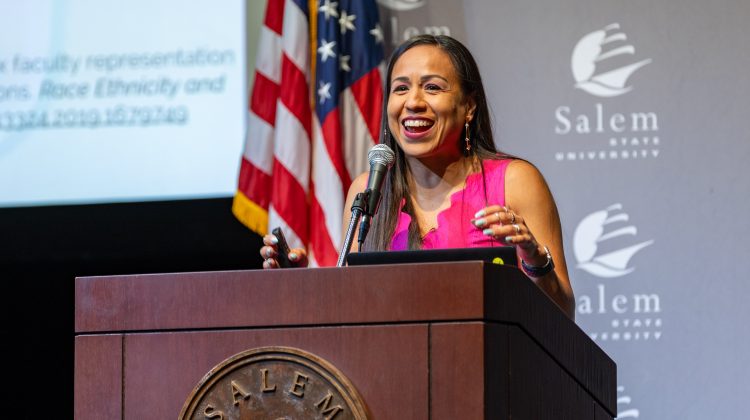SALEM — Representatives from more than 50 higher-education institutions took part in the inaugural New England Hispanic- and Minority-Serving Institution Conference at Salem State University this week.
During the conference, academic leaders of Hispanic-serving institutions (HSI) and emerging HSIs took part in workshops and breakout sessions to learn strategies to better serve their Hispanic student populations. Sessions covered topics such as undocumented-immigrant student success, recruiting Hispanic students, and creating inclusivity in the classroom.
An HSI is a federal designation for colleges and universities that have a Hispanic population of at least 25%, which allows institutions to apply for additional federal funding.
Welcoming attendees to the second day of the conference, Salem State President John Keenan said it was an “invigorating, full day of learning and fellowship.”
“I hope it was as inspiring for those who participated as it was for me,” he added. “I hope you’re all beginning to think about how you can take some of that work back to your campuses.”
Lt. Gov. Kim Driscoll, a Salem State alumna, said she was proud to be back at the university.
Driscoll said that the Healey-Driscoll administration has worked legislatively to pass the MassReconnect program, expand the MassGrant Plus financial-aid program, and provide in-state tuition for undocumented immigrants.
“We believe in the transformative power of our public colleges and our universities in Massachusetts to educate the next generation of our state leaders and innovators, and provide access to higher education for first-generation students, low-income students, and students of color,” she said.
“That’s ultimately what we’re talking about here when we talk about ensuring student success of Hispanic- and minority-serving institutions. We’re talking about opening doors and creating opportunities for the next generation of leaders, innovators, and doers who will move us all forward,” Driscoll added.
North Shore Community College is a recognized HSI, with approximately 30% of its student population self-identifying as Hispanic.
NSCC Chief Diversity and Equity Officer Nikki Pelonia, who attended both days of the conference, said he was grateful for Salem State for the opportunity and that he was looking forward to strengthening relationships with academic and community partners in furthering the initiative to serve Hispanic students.
He noted that 35% of students who attend NSCC at the school’s Lynn campus are Hispanic, which he attributed to Lynn’s Hispanic population.
“We want to make sure we are doing our due diligence to ensure we are serving that community,” he said.
He added he has no doubt in his mind that the college will be moving forward with a framework of “servingness,” the idea of prioritizing and centralizing the students NSCC recruits.
Keynote addresses were given by Gina Ann Garcia, the author of “Becoming Hispanic-Serving Institutions,” and “Transforming Hispanic-Serving Institutions,” and Deborah Santiago, the founder of Excelencia in Education, a nonprofit public-policy institute devoted to finding the best policies for Latino students.
During her address, Garcia shared her stories of working in higher education and gave attendees research-based recommendations on how to successfully retain and graduate Hispanic students.
Santiago shared recommendations on how to remove barriers to education and best serve Hispanic students through academic policies, as well as state and federal laws.

